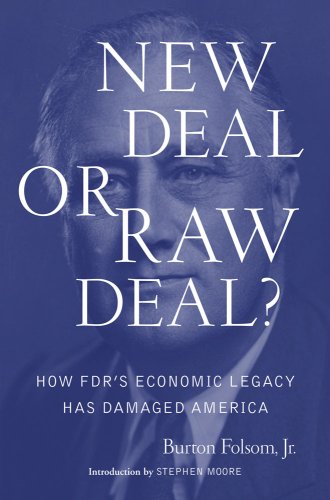 My A.P. United States history class is fast approaching the 1930s; well now that we have switched from a 90 minute block to a 45 “skinny” we are creeping along since the year started. We will hit the 1980s/90s just in time for the early May exam. Also, during this semester we will crank up the practice exams (using previous AP exams) and essay writing.
My A.P. United States history class is fast approaching the 1930s; well now that we have switched from a 90 minute block to a 45 “skinny” we are creeping along since the year started. We will hit the 1980s/90s just in time for the early May exam. Also, during this semester we will crank up the practice exams (using previous AP exams) and essay writing.
So back to the point of this post, The Great Depression and more specifically FDR’s “New Deal.” Numerous books have come out lately challenging the so-called Liberal or Progressive point of view (that goes something like this): Franklin D. Roosevelt’s New Deal policies were responsible for ending the Great Depression and that the causes of the depression were over-production, under-consumption, and unequal distribution of wealth.
The Books that I have been reading are: New Deal or Raw Deal?: How FDR’s Economic Legacy Has Damaged America by Burton W. Folsom Jr., FDR’s Folly: How Roosevelt and His New Deal Prolonged the Great Depression by Jim Powell, and The Forgotten Man: A New History of the Great Depression, by Amity Shlaes. Each book has basically the same take and none are perfect. They are at the least “skeptics” of FDR’s New Deal policies, and probably they are best described as fiscal Conservatives who downright loathed the big government shift of the 1930s.
My students will first read their textbook Out of Many: A History of the American People, which ignores most of the major issues the above authors point out with FDR’s policies.
The belief that unhindered capitalists brought the country down (thus leading to the Great Depression) due to greed (sound familiar?) is incorrect, according to the noted sources above. The major causes of the Great Depression, for example, as outlined by Mr. Folsom: 1) Negative consequences of WWI spending left the country with a national debt of $24 billion ( today its trillions) when it was before the war $1.3 billion. But most importantly, $10 billion was lent to European nations and most balked at repayments during the 1920s; 2) the Hawley-Smoot Tariff Act that crippled American businesses and production; and 3) poor performance by the Federal Reserve, which was designed to stop precisely what happened, a banking collapse. The Fed raised interest rates sharply in 1928 and 1929 that made it harder for money to be borrowed and slowed the flow of money. Mr. Folsom contends that inflation in the 1920s was low, not high, and that the 1920s was a decade of overconsumption than underconsumption. FDR latched onto the “underconsumption” analysis and allowed it to drive a majority of his economic policies.
OK, lots of issues, but the bottom line is, like most major historical events, the Great Depression is complex. Mr. Folsom is for my practical purposes here and in the classroom no more correct or incorrect than those others who would disagree.
Questions to be addressed: Was the Great Depression prolonged by FDR’s policies? Did FDR “save” jobs and save the economy enough to keep it afloat? Many of Roosevelt’s policies failed or at least produced such meager long-term results that it is hard to point to them as successes. A couple of programs that Mr. Folsom viciously attacks are the New Deal’s National Recovery Act and the Agricultural Adjustment Act. Both of which (and more) I will address in part II of this series on the Great Depression.
To be continued….
Oops, that was a two-parter. Let me try again:
“Was the Great Depression prolonged by FDR’s policies? Yes, most definitely, for all the reasons you’ve already stated.
Did FDR “save” jobs and save the economy enough to keep it afloat?”
No, he simply prolonged the inevitable, which is very similar to what the current administration and Congress is doing.
i don’t think he saved jobs but i am pretty sure he thought that the united states was capable of taking care of themselves when in fact they weren’t and he contradicted his beliefs which i why it took so long to get government relief
The New Deal staved off disaster, but not much more. But in the context of the time, it was a success. When people discuss New Deal Policy, they seem to think it was a “rough patch” rather than a near collapse of the economy. Today our unemployment stands a around 9%, during the depression it was at 25%! Additionally, you had the Dust Bowl occuring, destroting the ussually stable farming ecomonomy. Roosevelt was taking direct action rather than doing nothing. Thats the catch here. What would conservatives that disagree with Keynes have him do? Sit there with his thumb in his mouth and “hope” the Corporations figured things out? FDR attacked the problem, and the American people loved him for it. The guy was reelected 3 times! Some of his victories were landslides. To argue that the “New Deal” was a failure is to say the President should have sat back and watched the collapse of the economy. I highly suggest reading “No Ordinary Times” Dorris Kearns-Goodwin to get an appreciation for the strength and intelligence of Roosevelt. Revisionist History of “New Deal” policy is dangerous, and seeks to put forward the myth that the unchecked free market always knows best when it comes to economics.